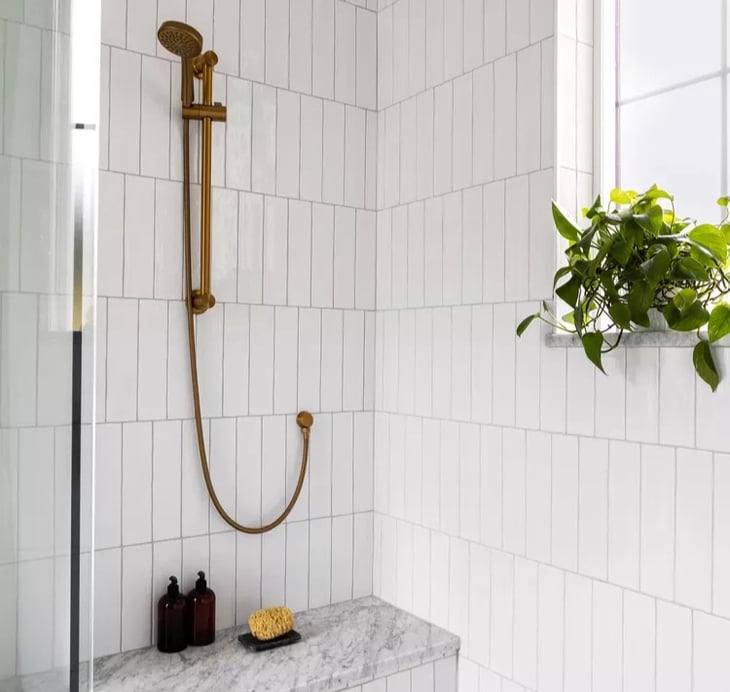
Whether to shower at the beginning or end of the day depends on each person's habits and preferences - Illustration photo
"There's no one-size-fits-all answer," Hannah Kopelman, MD, dermatologist and host of the Derm Club podcast, tells Health magazine.
“Showering in the morning can be a good way to boost circulation and start the day, especially for those who tend to sweat at night. Meanwhile, showering at night can help wash away sweat, pollution, and sunscreen.”
Bathing during the day has its pros and cons.
According to Dr. Anna Andrienko, dermatologist at Dr. Ducu Clinic, morning showers can promote blood circulation, eliminate sleepiness, and wash away night sweats. Morning showers can help you start the day feeling refreshed and rejuvenated.
Besides, bathing every morning also helps you:
- Increased energy : According to a survey by the Sleep Foundation, 73.3% of people said they felt refreshed or energized after showering in the morning.
- Increase circulation : Bathing in the morning can help increase circulation, reduce inflammation and relieve pain, especially when bathing with cool water before going out.
- Reduce tangles : Washing your hair at night can leave your hair tangled in the morning, but showering in the morning can help you maintain your hairstyle.
- Cleanse sweat : You tend to sweat while sleeping, so a morning shower can reduce body odor, leaving you feeling refreshed and clean.
While morning showers can be a great way to start your day, there are some downsides as well.
- Dirt buildup: Prioritizing morning showers means dirt, sweat, sunscreen, and pollution accumulated during the day remain on your skin and in your bed while you sleep, says Dr. Kopelman.
- Stress on hair and scalp : If you wash your hair in the morning and then heat style it, you may be stressing it out, especially if it's already brittle. In fact, dermatologists say dry or textured hair may not need daily shampooing.
When to take a bath at night
The above experts also said that taking a warm bath in the evening can help you relax and calm down, signaling to the brain that it is time to relieve stress.
You can wash away the dirt and grime of the day and go to bed clean. Besides, even if you choose to shower in the morning, it is still important to maintain a facial care routine at night.
In addition, the following factors are worth noting:
- Helps you sleep : Bathing at night helps you relax. It also helps your body temperature drop faster and sends signals to your brain to help you fall asleep easily.
- Wash away dirt and pollutants : Showering at night helps maintain skin hygiene because it removes everything from sunscreen and makeup to dust and dirt. According to Dr. Andrienko, this also helps reduce irritation and acne.
However, showering at night can also affect the health of your hair: Going to bed with wet hair can cause friction or even lead to fungal scalp problems if your hair is not dried properly. Choosing to shower with water that is too hot before bed can strip your skin of its natural oils and leave it dry and itchy.
Should you choose to shower at night or during the day?
If you have more time in the evening or want to promote sleep, bathing in the evening may be the best option.
But if you have trouble getting started in the morning or exercising before work, a morning shower may be the right choice for you to start your day feeling more energized and alert.
But if you prioritize sleep quality, showering at night is a better option. As for hair health, sleeping with wet hair is not ideal as it can cause hair breakage due to friction with the pillow.
If you wash your hair at night, Dr. Kopelman suggests towel drying your hair and, if necessary, using a hair dryer on a low heat setting to ensure your scalp is dry before bed.
Sleeping with wet hair can also lead to scalp problems like fungal overgrowth and scalp irritation. The damp conditions create an environment for yeast or bacteria to thrive, leading to sensitivity or even flaking.
Post-Workout Hygiene: Whether you work out in the morning or at night, you should plan to shower afterward. Sweat combined with bacteria can clog pores and increase breakouts or irritation, especially on the back or chest, says Dr. Andrienko.
Source: https://tuoitre.vn/nen-tam-ban-ngay-hay-tam-truoc-khi-di-ngu-20250530102312709.htm























![[Photo] National Assembly Chairman Tran Thanh Man visits Vietnamese Heroic Mother Ta Thi Tran](https://vphoto.vietnam.vn/thumb/1200x675/vietnam/resource/IMAGE/2025/7/20/765c0bd057dd44ad83ab89fe0255b783)















































































Comment (0)